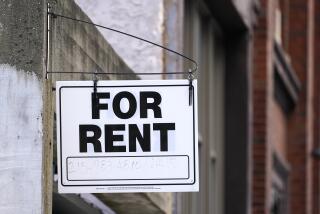Court decision targets mystery closing fees
- Share via
Reporting from Washington — A federal district court has handed down a ruling in a class action that could have a direct effect on the fees you pay to the real estate company at closing, whether as a buyer or seller.
The decision targets one of the most common practices adopted by brokerage firms in recent years: charging consumers “admin,” “processing,” “ABC” and other mystery fees ranging from $150 to as much as $500 per transaction. The fees are tacked on top of regular commissions and sometimes come as last-minute surprises on settlement sheets.
Typically the charges are imposed by the brokerage company owners and go straight to their accounts, rather than being shared with sales agents. When pressed about why buyers or sellers should be hit with hundreds of dollars extra at closing when thousands of dollars of commissions are already being charged in the deal, some sales agents say, “It’s the broker’s policy -- we don’t get any of this money.”
For their part, brokers say they need the add-on fees to stay in business, especially when their commission splits with top agents can exceed 90%, sales volumes are down and overhead expenses keep rising. The general counsel of the National Assn. of Realtors, Laurie Janik, defends the fees, arguing that brokers “ought to be able to charge what they need to make a profit.”
But are these fees legal? In a decision late last month that is sending shudders through the realty brokerage industry, U.S. District Judge Virginia Emerson Hopkins in Birmingham, Ala., ruled that when a realty firm charges clients an “admin” fee -- for which no specific settlement services are performed -- the fee violates federal law.
The case involved RealtySouth, one of the 20 major brokerage units of Minneapolis-based HomeServices of America Inc., the second-largest realty firm in the country. RealtySouth was sued by home buyer Vicki V. Busby of Jefferson, Ala., when she was required to pay a $149 “ABC” fee -- an administrative brokerage commission. The court found no evidence that the brokerage company performed any services beyond those covered by the commission, thereby violating a federal real estate settlement statutory ban against “unearned” fees.
Other federal courts have interpreted the statutory language on unearned fees differently, so the RealtySouth case does not settle the issue.
Busby’s lawyers estimate the class of affected consumers at about 30,000 -- all RealtySouth clients who’ve paid ABC fees in recent years that were, based on the district court’s ruling, illegal.
Dana Strandmo, general counsel and senior vice president for HomeServices of America, said the company hadn’t decided whether to appeal the decision. Strandmo confirmed that charging “admin” fees “is a very widespread practice,” not only at his firm but throughout the industry.
Frank Borges Llosa, a broker who runs Frankly Realty Inc. in Northern Virginia and an outspoken critic of what he calls “bogus admin fees,” blames brokers and agents for their increasingly common use. In a posting on his blog, Llosa said brokers were charging these fees “because they can’t make enough from the agents.” Why? Because the agents are demanding bigger splits of the commission dollar, leaving brokers with less and less, he said.
Llosa provided this hypothetical example: Say an agent who gets a 60% split of the commissions he or she brings in -- the broker gets 40% -- is approached by a competing brokerage firm that will pay 70%, but also imposes a $300 admin fee that either the agent or the client has to pay.
After switching to the new brokerage, the agent tells clients, “Oops, sorry, this firm charges $300 more per deal, nothing I can do about it.” Meanwhile, on a $10,000 commission the new company gives the agent $1,000 more while charging $300 to their clients. “It’s really despicable,” Llosa said in an interview.
Janik at the National Assn. of Realtors says brokerages need to move to a more standardized system of flat-fee-plus-commission compensation that is prominently disclosed to all clients. Listing agreements might, for instance, indicate that the company’s compensation includes a base fee -- say $500 -- plus a standard sales commission of, say, 5%.
“If [brokers] do it that way and don’t get fancy,” she said, they should be immune from legal attacks over unearned fees, such as in the RealtySouth case.
What should consumers do? First, make sure you get full disclosure about all compensation and fees associated with any sale or purchase upfront. Then, if you don’t like what you see, you can always take Janik’s advice: “Walk down the street to another broker.”
Distributed by the Washington Post Writers Group.
More to Read
Inside the business of entertainment
The Wide Shot brings you news, analysis and insights on everything from streaming wars to production — and what it all means for the future.
You may occasionally receive promotional content from the Los Angeles Times.







